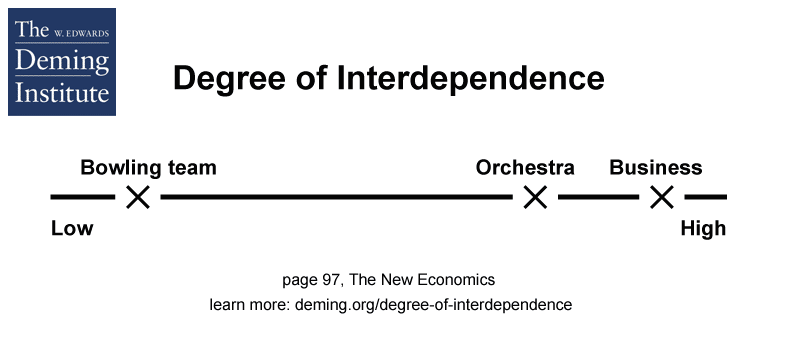By John Hunter, founder of CuriousCat.com.

Dr. Deming discusses the interdependence of business in: Managing the Organization as a System.
For example, in a bowling team each one plays his one solos, on the other hand in an orchestra it is all interdependence. They work together as a system. I’d say that the degree of interdependence is probably greater in a business than it is in an orchestra.
The greater the inter-dependance between sub-processes the greater be the need for communication and cooperation. Management’s job is to optimize the system.
A good example of a system well optimized is a good orchestra. The players are not there to play solos as prima-donas, to catch the ear of the listener, they are there to support each other.
This is a wonderfully vivid example. People can appreciate the need to optimize the system and not the individual pieces of an orchestra. It is obvious each component of the orchestra reducing their waste (all that time not playing) isn’t going to make a better end result.
It isn’t as easy to appreciate the destructive impacts of optimizing components of a management system without appreciating the interactions and interrelationships within the organization. But the simple image above is a useful reminder that when we are in management if we are not thinking about the end result of the system we risk optimizing component to the detriment of the whole. Business is more interdependent than an orchestra yet we often ignore the interdependence and seek to optimize components.
We need to Optimize the overall system, not the individual components. That is easier to say than to do. The links in this post provide more information on thinking in this manner and managing with this understanding.
In a previous post, People Copy Examples and Wonder Why They Don’t Succeed we quote Russell Ackoff: “Yes. The art of managing interactions is very different indeed than the management of actions, and history requires this transition for effective management.”
Related: Break Down Barriers Between Departments – Silos to Systems: Presentation by Lisa Snyder – Dr. Russell Ackoff Webcast on Systems Thinking – 94% Belongs to the System – Distorting the System, Distorting the Data or Improving the System – Leadership and the New Science – Root Cause, Interactions, Robustness and Design of Experiments – Eliminate Sales Commissions: Reject Theory X Management and Embrace Systems Thinking


